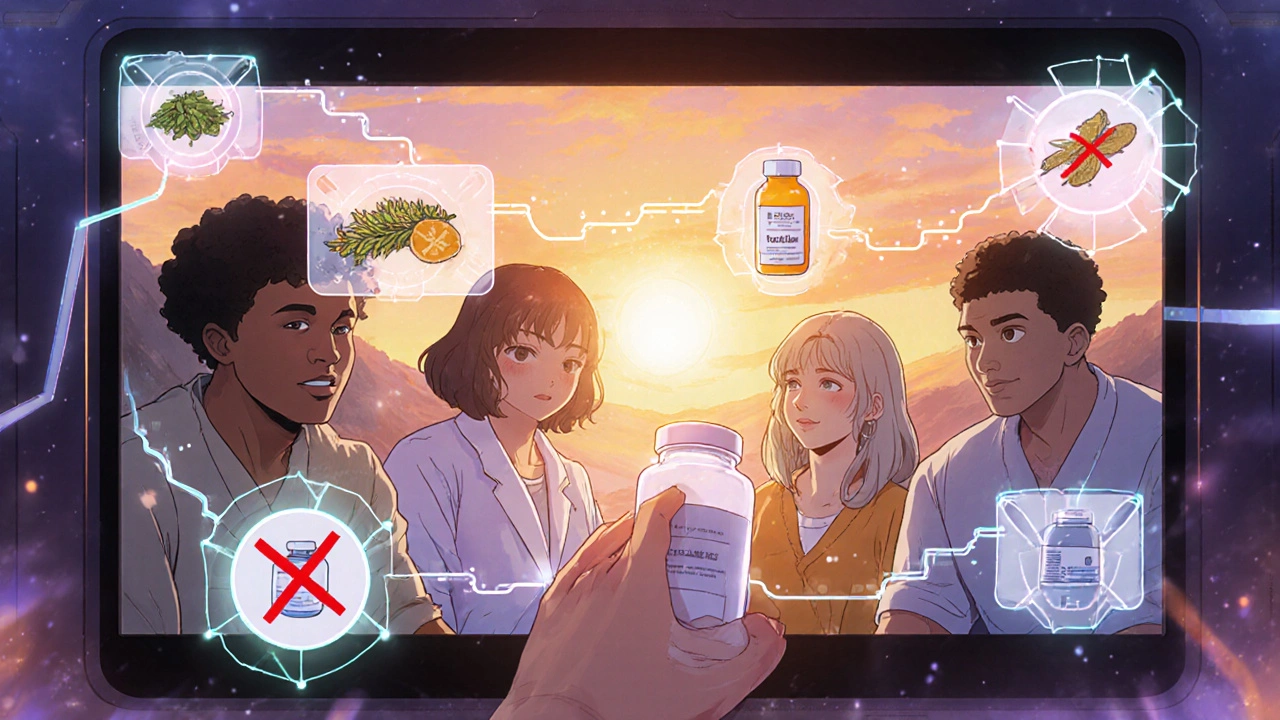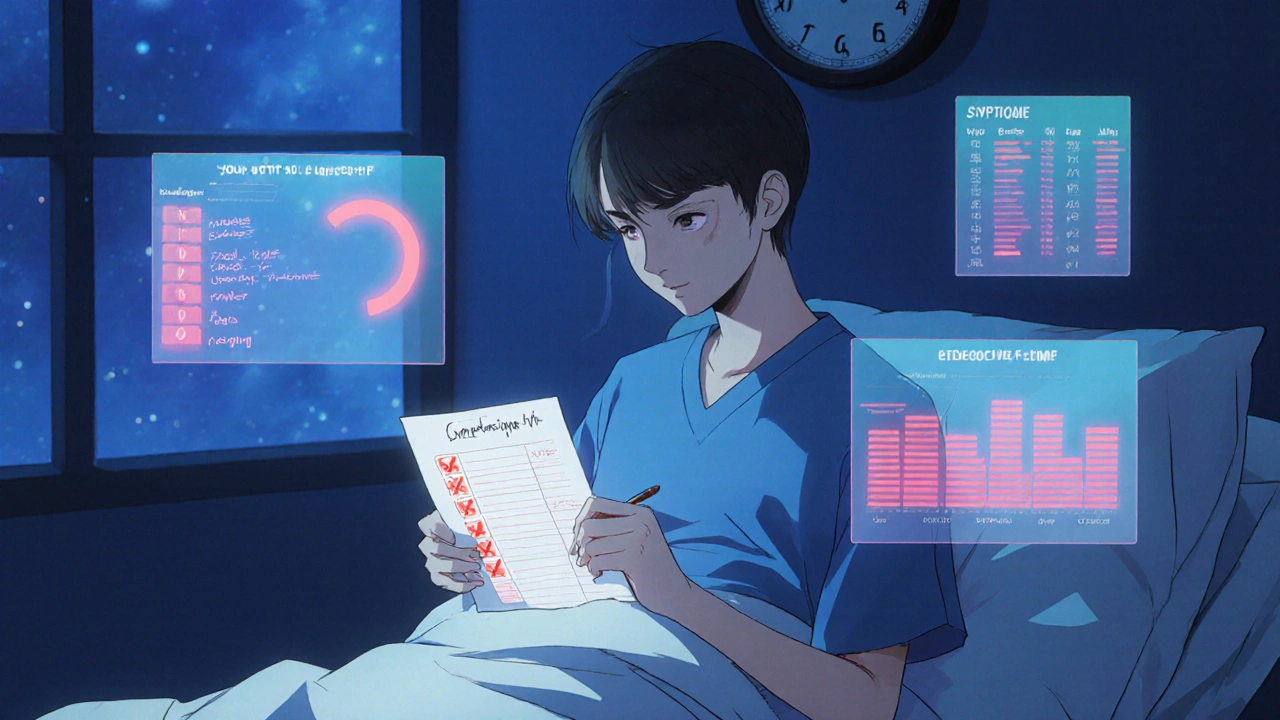Medication Side Effects Assessment Tool
How to Use This Tool
This tool helps you determine if your medication side effects require a second opinion. Enter your symptoms, duration, and impact on daily life to get personalized guidance based on medical guidelines.
Feeling off after starting a new medication? You're not alone. But how do you know if it's just a temporary tweak your body needs-or a sign something’s seriously wrong? Too many people push through nausea, fatigue, or brain fog, thinking it’s just part of the deal. But here’s the truth: medication side effects aren’t always harmless. Sometimes, they’re a red flag that your treatment needs a second look.
When Side Effects Are More Than Just Uncomfortable
Not every weird feeling means you need to switch drugs. But some symptoms are warning signs you shouldn’t ignore. If you’ve had persistent nausea for more than three days and it’s stopped you from eating properly, that’s not normal. Same goes for unexplained weight loss or gain-more than 5% of your body weight in two weeks. These aren’t random quirks. They’re signals your body is struggling. Neurological changes are another big red flag. If you suddenly feel shaky, confused, or notice memory lapses that weren’t there before you started the medication, don’t wait. These could be signs of drug toxicity or an interaction you didn’t know about. A 2023 study found that 28% of patients who sought second opinions for these kinds of symptoms needed immediate dosage changes to avoid serious harm.When the Medication Just Isn’t Working
Sometimes, the side effects aren’t the only problem-the drug isn’t doing its job either. For antidepressants, you should give it at least four to six weeks to kick in. For cholesterol meds, it’s two to three months. Diabetes or osteoporosis drugs? Give it three to six months. If you’ve hit those timelines and still feel the same-or worse-then it’s time to ask: Is this the right drug for me? A 2023 JAMA Internal Medicine study tracked over 2,400 second opinions and found that nearly 38% of psychiatric medication reviews led to major changes. That’s not a small number. It means a lot of people are stuck on drugs that don’t work for them, simply because no one asked the right questions.Dosage Isn’t One-Size-Fits-All
Your body isn’t the same as your neighbor’s. Some people process drugs faster. Others are slow metabolizers. That’s why therapeutic drug monitoring matters. If your blood levels are outside the 10-20% therapeutic range (as defined by the Clinical Pharmacogenetics Implementation Consortium), your dose might be too high-or too low. This is especially true for medications like antidepressants, seizure drugs, or heart medications. And don’t forget supplements. A 2024 NIH report found that 31% of side effect reports were linked to interactions between prescription drugs and over-the-counter vitamins or herbal products. St. John’s Wort with SSRIs? Turmeric with blood thinners? These aren’t myths-they’re documented risks. Bring your full list-every pill, every drop, every powder-to your second opinion.
How to Prepare for a Second Opinion
Going in blind won’t help. The most successful second opinions happen when patients come prepared. A 2024 Annals of Internal Medicine study showed that patients who brought detailed records were 63% more likely to get a meaningful change in their treatment. Start with a timeline: When did you start the medication? What dose? When did the side effect begin? Write down the exact time and day. Track your symptoms on a scale of 1 to 10. Note what makes them better or worse. Did the dizziness start after lunch? Did the fatigue hit after you skipped breakfast? Use the SOMA method: Situation (when and where symptoms happen), Objective data (blood pressure, weight, lab results), Modifications you’ve tried (taking it with food, changing time of day), and Activities affected (can’t work, can’t sleep, can’t play with your kids). Bring your last 6 months of prescriptions, recent lab work (within 30 days), and a printed symptom log. Don’t rely on memory. Write it down.What to Expect From the Second Opinion
The second doctor won’t automatically switch your meds. They’ll look at your history, your symptoms, your lab results, and your lifestyle. They might suggest a lower dose, a different drug, or even a non-drug alternative. For example, patients on metformin with ongoing stomach issues often discover they have undiagnosed gastroparesis. Switching to a different diabetes drug-like a GLP-1 agonist-can solve both the side effect and the underlying problem. A 2024 Health Affairs study found that patients using telehealth platforms for second opinions got answers 28% faster than those going through traditional referrals. That’s a big deal when you’re suffering.
Who Should Definitely Get a Second Opinion?
Certain groups benefit more. If you’re on:- Antidepressants (especially SSRIs)-21% of all second opinion requests
- Anticoagulants like warfarin or Eliquis-18% of requests
- Diabetes meds like insulin or metformin-15% of requests
- Statins-muscle pain is common, and 73% of Reddit users who sought second opinions got a better alternative
Why Most People Don’t Ask-And Why They Should
Many patients don’t seek second opinions because they fear offending their doctor. Or they think it’s unnecessary. But here’s what the data says: 89% of patients who sought second opinions felt their concerns were taken more seriously the second time around. And 76% reported better communication-doctors used the “teach-back” method, asking them to explain side effects in their own words to confirm understanding. The American Medical Association now says doctors should encourage second opinions when side effects affect two or more areas of daily life-like work, sleep, and relationships. That’s not a suggestion. It’s a standard.The Future Is Personalized
New tools are making second opinions smarter. The FDA approved MedCheck AI in May 2024-a platform that lets you upload your meds and symptoms for a preliminary analysis. It’s not a replacement for a doctor, but it flags patterns with 89% accuracy. Pharmacogenomic testing is also expanding. By 2025, guidelines now cover 42 gene-drug pairs. That means your DNA could soon tell your doctor which drugs are safest for you before you even take them. The bottom line? You have the right to question your treatment. Side effects aren’t something you just live with. They’re data. And that data can save your health.How long should I wait before seeking a second opinion about medication side effects?
Don’t wait if side effects are severe-like persistent nausea, unexplained weight loss, or neurological changes. For less urgent symptoms, give the medication its full trial period: 4-6 weeks for antidepressants, 2-3 months for cholesterol drugs, and 3-6 months for osteoporosis treatments. If there’s no improvement or symptoms worsen, it’s time to seek another opinion.
Can I get a second opinion without telling my current doctor?
Yes, you can. While it’s ideal to keep your current doctor informed, you don’t need their permission to seek a second opinion. Many patients use telehealth services or specialists directly. However, sharing your records with the second doctor ensures better care. Most doctors actually encourage second opinions-it’s part of patient safety standards.
Are second opinions covered by insurance?
In the U.S., Medicare covers second opinions for 28 specialized medication categories under its 2024 Physician Fee Schedule, with reimbursement around $187 for a 30-minute consultation. Private insurers vary, but most cover second opinions if they’re deemed medically necessary. Always check with your plan before scheduling.
What if the second doctor agrees with the first?
That’s still valuable. It confirms your treatment is appropriate and gives you confidence to continue. Sometimes, the second opinion helps you understand why the first doctor chose that medication, which can improve adherence. You’ll also leave with clearer instructions on what side effects to watch for and when to call back.
Can AI tools replace a second opinion from a doctor?
No. Tools like MedCheck AI can help identify potential side effect patterns and flag risks, but they can’t diagnose or prescribe. They’re best used as prep tools before seeing a doctor. A human expert still needs to interpret your full history, lifestyle, and symptoms to make safe, personalized decisions.
How do I know if a side effect is really from my medication?
Doctors use the Naranjo Scale to assess if a side effect is likely caused by a drug. A score above 5 means it’s “probable.” You can help by tracking when symptoms started-side effects that begin within 72 hours of starting a new drug have a 78% chance of being linked to it. Your symptom log is your best evidence.
Is it worth getting a second opinion for minor side effects?
If the side effect is minor and temporary-like mild headache or dry mouth-it may not need a second opinion. But if it’s affecting your quality of life-even if it seems small-like trouble sleeping or reduced energy-it’s worth discussing. The American Medical Association now recommends second opinions when side effects lower your daily functioning below 60% of your baseline.

Jenny Kohinski
November 1, 2025 AT 14:23